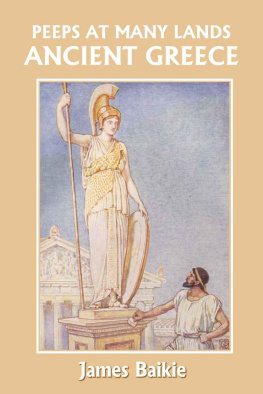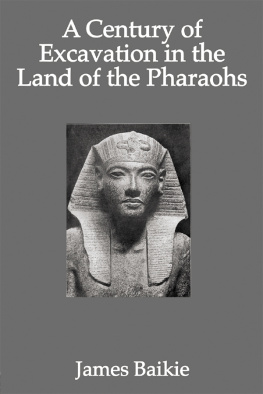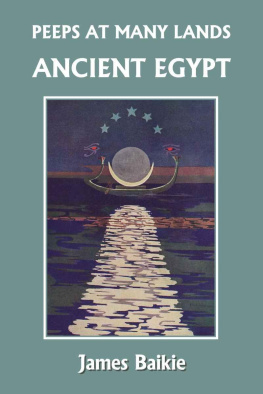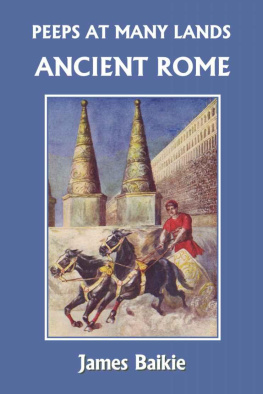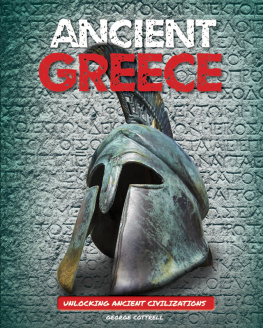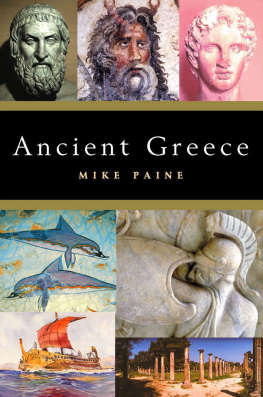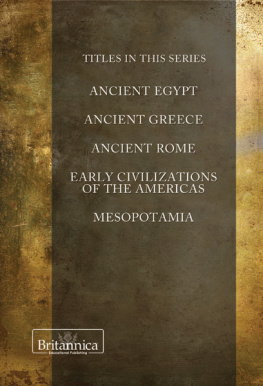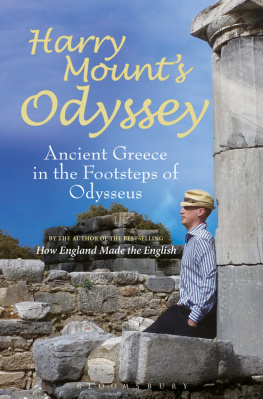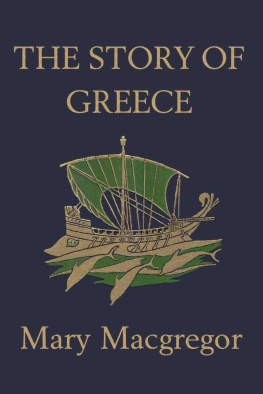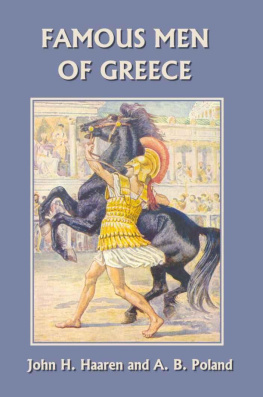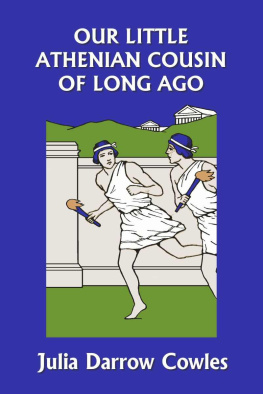Ancient Greece
by
James Baikie
Yesterday's Classics
Chapel Hill, North Carolina
Cover and Arrangement 2010 Yesterday's Classics, LLC
All rights reserved. No part of this book may be reproduced or retransmitted in any form or by any means without the written permission of the publisher.
This edition, first published in 2010 by Yesterday's Classics, an imprint of Yesterday's Classics, LLC, is an unabridged republication of the work originally published by A. & C. Black, Ltd. in 1920. This title is available in a print edition (ISBN 978-1-59915-289-9).
Yesterday's Classics, LLC
PO Box 3418
Chapel Hill, NC 27515
Yesterday's Classics
Yesterday's Classics republishes classic books for children from the golden age of children's literature, the era from 1880 to 1920. Many of our titles are offered in high-quality paperback editions, with text cast in modern easy-to-read type for today's readers. The illustrations from the original volumes are included except in those few cases where the quality of the original images is too low to make their reproduction feasible. Unless specified otherwise, color illustrations in the original volumes are rendered in black and white in our print editions.
Contents
CHAPTER I
SKETCH-MAP OF ANCIENT GREECE
The Torch-Bearers
A MONG all the peoples of the ancient world, there have been three, who, as it were, have been chosen by Providence to hold high the torch of Knowledge, that all other nations might see its light, and follow where the torch-bearers led.
Of these three, one, in the beginning, was a little knot of men who, according to their own ancient stories, had come from a far country to the pleasant land of Italy. There, after many wanderings and adventures, they founded, on the banks of the River Tiber, a city which grew to be the great and famous city of Rome, and which came at last to hold empire for many a day over almost all the world, as men knew it in those far-off times. To Rome it was given to hold high the torch of the knowledge of Law. For the Romans' watchwords were ever Order and Obedience, and what they themselves had learned in long ages of storm and stress they imposed upon all the nations that came under their sway, so that the Law of Rome ruled the actions of all civilized men in Europe for hundreds of years. And, ever since, the laws which the Romans framed for their own guidance have been the model after which the nations have shaped the varying codes of law under which they live.
The second of the three was a race of mingled blood which rose to greatness among the fertile valleys that lie between the mountains and the far-stretching gulfs and bays of the fair land of Greece. For among the ancient race of dark-haired Southerners who dwelt in Greece and its isles before the dawn of history, there came troops of big, fair-haired men from the North, Achans, Dorians, and the like. Swarm after swarm they came during many years, conquering the gentler Southerners, and then settling down among them, and mingling with them in marriage, till, from this union of North and South, there arose a new race, with the strength and courage of the North, and the swift wit and love of beauty of the South, so that the men of Hellas, as Greece was called in the old days, were the cleverest, the most inquiring, and the most artistic of all the races of that old world.
To Greece it was given to hold high the torch of Wisdomthe wisdom that deals with all things of the mind, and with all beauty of the earth and man. Never, in that ancient world, never, perhaps, in all the world's history, has there been a race that has bred so many deep thinkers, so many seekers after the truths of nature, so many great singers and dramatists, above all so many great artists in sculpture and painting as this little people of Hellas. In the van of all the companies of great men from among all the peoples, who through the ages have sought after wisdom and beauty, you shall always find a Greek holding up his light for the rest to follow. Wherever men inquire into the mysteries of the human mind and life, they are following in the footsteps of Greek leaders. Wherever, in poem or in tragedy, they try to sing the greatness or the sorrow of mankind, it is a Greek who has struck the first note. Wherever they seek, in sculpture or in painting, to express the beauty and wonder of life, they are following those great Greek artists who first gave to the world the idea of beauty, serene, balanced, perfect, and whose wonderful works have never, in many respects, been surpassed, nor will be.
The third of the torch-bearers was a little race of wholly Eastern blood. Long time thralls in the land of Egypt, slaves of that mighty ancient civilization at whose relics we still marvel, they were freed at last, and found a home in the little, rugged, unattractive hill-country of Palestinea land that was little more than the bridge between the two great empires of Assyria and the Nile. There for a little while they held a troubled sovereignty, and then for many generations were bowed under the yoke of greater nations; and there they gradually wrought out the great task which it was given them to do in the history of the world.
The Roman's task was a great oneto give Law to the world. The Greek's was greater stillto give Wisdom and Beauty. But greatest of all was the task of the Hebrew; for to him it was ordained that he should be the torch-bearer of the knowledge of God, and teach to the world the truth of things eternal. He was to have none of the power of Rome; he was never to know the Greek thirst for wisdom; he scorned and abhorred the Greek craving for earthly beauty. But he held before men's eyes a greater light than either, and rose to thoughts about God far nobler, truer, purer, than ever were reached by Roman law-giver or Greek philosopher, so that the world sees God to-day by the light that first dawned among a handful of Hebrew serfs, grew to its morning brightness in a third-rate Oriental kingdom, and reached its meridian glory in the life and teaching of a Jewish carpenter.
Now of Rome and the Romans I have written somewhat already in one of these little books; and perhaps I may tell you some day, in another, of Palestine and the Hebrews. Meanwhile my task is to tell you what may be told in a little space of the second of these Torch-Bearers of the Worldof the beautiful little land of Hellas, which we call Greece, and of that wonderful race of men who called themselves Hellenes, and are called by us Greeks, the splendour of whose genius flamed at its highest for little more than two centuries, yet has lightened all the world ever since with its glory.
If you look at the map of Europe, you will see that the Continent throws out southwards into the sea three great projections or peninsulas, and that these three peninsulas are all separated from the lands to the north of them by great mountain ranges. Western-most of the three is the land which the ancients knew as the Iberian Peninsula, and which we call Spain and Portugal. Midmost, projecting like a big boot-leg into the Mediterranean, is Italy. Easternmost comes Greece, not so clean-cut as the other two, nor so separate from the mass of Europe to the north, lying quite close to Asia Minor, to which it is almost joined by a group of little islands dotted over the gean Sea.
These three peninsulas have all played a great part in the history of the world; Spain and Portugal, perhaps, not quite so great a part as the other two, though we must not forget what the world owes to the famous navigators and explorers of these lands. Their mountain walls to the north kept them free for a long time from the assaults of the fierce and rude tribes of Northern Europe, and allowed them to develop their own life. Their easy access to the sea was always tempting them to adventure and conquest. And of the three peninsulas it was the smallest and most easterly where European men first wakened to civilized life, and first began to shape the world to its present form.

